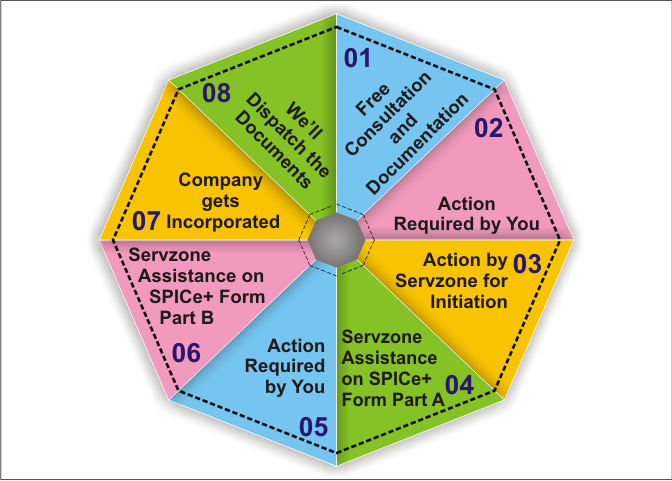Get Started With
servzone
Overview
As a company grows, business requests and the downsides of a controlling firm may require a business person to initiate a method to convert sole ownership into a privately owned company. A private limited company provides significant advantages over a sole proprietary type of business, including limited liability, the ability to draw equity capital, a continued presence and so on.
Private Limited vs. Proprietorship
- The sole proprietor will retain with unlimited liabilities for any loss. In simple terms, the proprietor is liable to pay personally for any loss bears by the firm. On the other hand, the rules and laws of a private limited company treat the owner and the company as a separate legal entity, thereby limiting the owner's liabilities.
- Often the sole owner does not have sufficient funds-raising options, where the private limited company has the benefit of fund-raising options.
- Proprietor's demand may end the firm's tenure, on the other hand, the private limited company justifies the legal heir to handle business matters.
Opportunities and Obstacles
These effects are important to consider for managers who need to change from a sole proprietorship to a private limited company:
- Separate legal existence
Even though you have more self-government advantage over the market, you are monetary and legitimately in charge for all risks against the market, for example, in commitments and in claims.
- Responsibility
As a private limited company registered under the Companies Act 1956, the business has separate legal status from the proprietor; Members of the organization have limited liability. For sole proprietorship, loan providers can take legal action against you for loans and use in your property and business. Therefore, a single owner is at greater risk of complete personal budgetary ruin than the CEO of a private limited organization.
- Limited Capital
Sole proprietorship has reduced options to regularly increase subsidies, whether it is to move from monetary establishment or to equity fundraising from commercial experts – Which means that your roots of working capital are forced to move towards your cash and any profits you make from the business.
- Gradual succession
A sole proprietorship ’ Legal presence is conditioned on your reality. Therefore your retirement or end will simultaneously mean the end of your business, as such, your relatives and partners who are willing to get on with the business are certainly not able to do so without the managerial problem of joining the industry. Honega - which is not the case with private limited company.
- Administrative burden
Density provisions of a private limited company are much more valuable, it is in continuity than sole proprietorship but the issues dealt with under sole proprietorship become more complicated for the sole proprietor. Similarly, 'Private Limited Company' is recognized by laws, principles and guidelines under the Indian Companies Act.
Reminders
- An agreement must be gone into between the sole proprietor and the private limited company for the exchange.
- The Memorandum of Association (MOA) of the Private Limited Company ought to include an entity that declares – “The takeover of a sole ownership interest”.
- All the privileges and liabilities of the sole proprietorship firm should be converted to the private limited company.
The sole owner ought to be a feature of the organisation ’s directorial board with a voting rule which comprises to in any event share of that of the organisation. It might be noticed that a private limited company need to have at least two directors.
Benefits
- A certified company makes it accurate and enhances the authenticity of your company.
- Protects from personal responsibility and secure from other risks and cons
- Draws more Clients
- Provides bank credits and excellent investment from adequate investors
- Protect your company’s Property
- More exceptional capital contribution
- Increases the capability to grow big and evolve
- Stockholders have a right to appoint the directors to act on behalf of him.
- Even after the death of directors/ stockholder company will exist without any discrepancies.
- The stockholders and the directors will get complete immunity from being sued by the third party except for personal issues.
- It involves lower tax rates and subsidies under the Income Tax Act, 1961.
- The interest profit of the private limited company is objected to the tax rate of 30% + surcharge & cesses as applicable.
Basic requirements
As per the commands and regulations of Company Act, 2013, in order to incorporate any company to be certified in India, the below options have to be met
- Number of Directors
A private limited business must have at least two directors and a maximum of 15.
- Different name
Your business title must be unique. The proposed name should not resemble any existing company or trademark in India.
- Minimum capital share
is not the least capital amount for a company.
- Designated Office
It is not necessary to have commercial space in the registered office of a company. Even a rented house can be a registered office, if NoC is obtained from the landlord.
- Memorandum of Association In the Contents section of the Memorandum of Association (MOA), an expression must exist “ Sole Proprietary Concern ” Acquisition or acquisition of;
The private limited company should file an annual economic accounting statement and annual return with the company's registrar every year.
Required Documents
- The Articles of Association
- Memorandum of Association
- Declaration by the subscribers and by the directors.
- A confirmation for the address of the office
- Two Months Utility Bills copy
- Certificate of incorporation of the Outer Country body corporate
- A resolution passed by the global Company
- A recommendation declared by the promotional Company
- The interest of the directors in from other entities
- Nominee’s assent
- Identity proof and residential address of the subscribers and the nominees
- Identity proof and residential address of Applicant 1,2 and 3
- The Declaration/Resolution of the unregistered companies
- Declaration in Form 'INC-14' and Form 'INC-15'
Following Conditions
- After incorporating a new private limited company, all the assets and liabilities of the old sole proprietorship will be completely transferred to the company.
- Even after the conversion takes place, the old sole proprietorship will hold 50% of shares in a new private limited company. i.e 50% of the voting rights will be held by a sole proprietorship.
- The old sole proprietor will hold shares for a minimum period of 5 years from the date of incorporation of a new private limited company.
- Similarly, there will not be any monetary consideration between a sole proprietorship and private limited company as it is a mere conversion, not sale.
Recent Amended Regulation for Companies under Form SPICe Plus
All the companies mandatorily will have to file sanctioned returns whenever they exceed the applicable threshold limits under the form SPICe Plus (SPICe+) latest association standards which have also got their EPFO/ESI numbers.
Features of SPICe Plus
Recently the Government has published the comprehensive features of the SPICe Plus form (SPICe+) to clear the value of the construction as well as make a lead for a piece of good information. SPICe Plus form (MCA Form SPICe+) is said to dedicate ten services via three central govt ministries and departments which are Ministry of Labour & Department, Revenue in the Ministry of Finance and Ministry of Corporate Affairs. The new SPICe Plus form is said to save good time and method maintenance of the concerned people and has been incorporated for all the new companies from February 23. The other forms that need to be filed along with SPICe+ are AGILE-PRO, SPICe+AoA and SPICe+MoA.
Step By Step Procedure
- Click ‘SPICe+’ placed under ‘MCA Services’.
- After that Choose ‘New Application;
- You can prefer ‘Existing Application’, fill in the application number with the proposed or approved name. Click ‘Type of Company’
- Click ‘Class of Company’, and the ‘Category of Company’'
- Click ‘Sub-Category of Company’
- Next, you have to specify the ‘Main division of industrial activity of the Company’
- Next, you have to mention the ‘Main division of industrial activity of the Company’
- You also need to provide details of the ‘proposed or approved name’. Click the ‘Auto-check’ in accordance with the rules administering the name. Submit the ‘Part A’ for reservation of name or proceed with the incorporation.
- Part B has different sections for ‘check form’ for each section.
- The details required for registration
1. Location of the registered office of the company
2. Advised directors and subscribers
3. Resources of the company
4. Other learning to apply for tax registrations such as PAN and TAN - Conduct a ‘pre-scrutiny’ check. A confirmation is presented upon successful submission of the form.
- Download the PDF of Part B proposed for affixing the DSC and for filling up any linked forms along with Part B. The forms linked to SPICe+ are AGILE-PRO, SPICe+MoA and SPICe+AoA, URC-1 and INC-9. Part B of SPICe+ and linked forms can then be uploaded on the MCA portal. A Service Request Number is generated for making a payment towards Private Limited Company incorporation. Once the payment is made successfully, the forms would be processed.
- In a case where the forms need resubmission for any errors being flagged upon processing, the SPICe+ form has to be resubmitted in the same manner.
Manual to Web-based SPICe + Filing Form Following MCA
SPICe Plus serves many requirements like name reservation, incorporation, DIN allotment, mandatory issue of PAN, TAN, EPFO, ESIC, Profession Tax (Maharashtra) and Opening of Bank Account and acquire the GSTIN via SPICe + form.
Part A:
Name Reservation (New Companies only)
Part B:
- Company Incorporation
- Application for DIN
- PAN Application
- TAN Application
- GSTIN Application
- EPFO Registration
- ESIC Registration
- Opening of Bank Account for the Company
- Profession Tax Registration (only for Maharashtra)
How We Can Help You?


GST Registration

PVT. LTD. Company

Loan

Insurance


